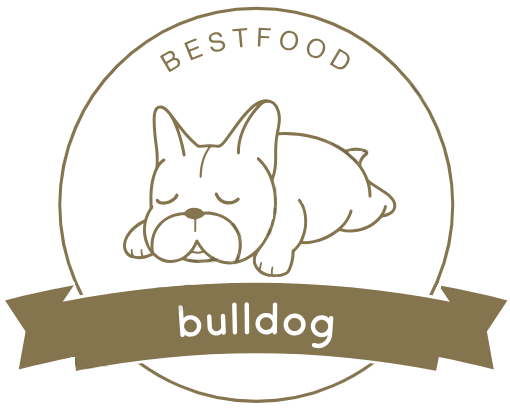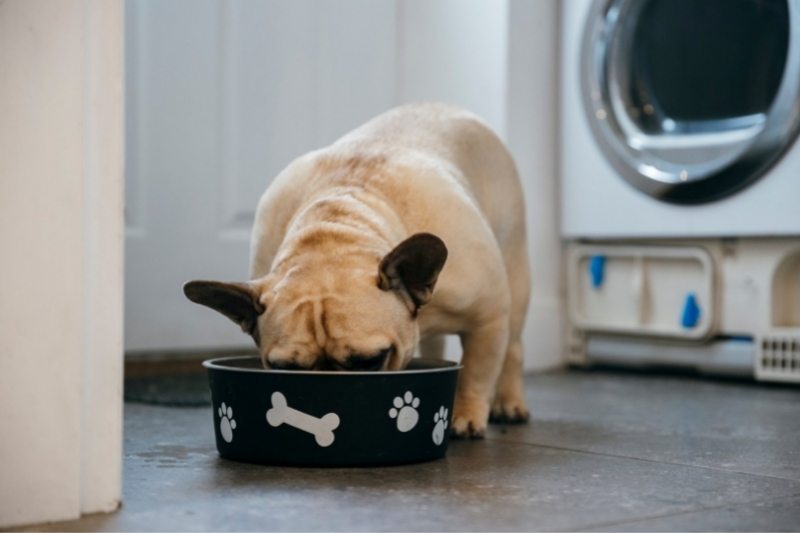
Introduction
Owners of French Bulldogs often inquire about how much should a french bulldog eat . Addressing this concern necessitates a comprehensive grasp of the nutritional requirements essential for maintaining the overall health and vitality of these beloved companions. Adequate nourishment not only facilitates their physical development and sustains optimal energy levels but also serves as a preventive measure against a myriad of health ailments. Thus, determining the precise amount of food is paramount in ensuring their enduring fitness, contentment, and well-being throughout their lifespan.
Understanding French Bulldog Nutrition
Macronutrient Breakdown
A well-rounded diet for a French bulldog should consist of the following proportions of macronutrients:
- Protein:French bulldogs require a diet rich in protein to support their muscle upkeep and overall well-being. It is recommended to have a protein level of 20-30% in their meals.
- Fat:Essential fats are important for sustaining energy levels and promoting a glossy coat. A fat content of 10-15% is generally suitable.
- Carbohydrates:While not as crucial as protein and fat, carbohydrates offer necessary energy. They should account for approximately 30-50% of the diet.
Factors Influencing Dietary Needs
- Size and Weight:French bulldogs are dogs that are small to medium in size, but have a sturdy physique.
- Age:The nutritional needs of French bulldogs vary as they transition from being puppies to adults and eventually into their senior years.
- Activity Level:French bulldogs who are more active may require a higher calorie intake, whereas those who are less active may need fewer calories.
- Health Conditions:Certain health problems may require changes to the dog’s diet.
Caloric Needs and Portion Sizes
French bulldogs are a small breed that usually weighs between 16 to 28 pounds. Their calorie requirements can vary depending on factors such as age, weight, and how active they are. On average, an adult French bulldog needs approximately 25-30 calories per pound of body weight each day.
- Puppies (2-6 months):Puppies require more calories to support their rapid growth. Typically, a French bulldog puppy may need about 400-600 calories daily, spread out over three to four meals.
- Adults (7 months – 6 years):Adult French bulldogs generally need around 500-700 calories per day. It’s recommended to divide this into two meals to prevent bloating and aid digestion.
- Seniors (7 years and older):Senior Frenchies tend to have a slower metabolism and might require around 400-600 calories per day, depending on their activity level and overall health.
How much should i feed my french bulldog
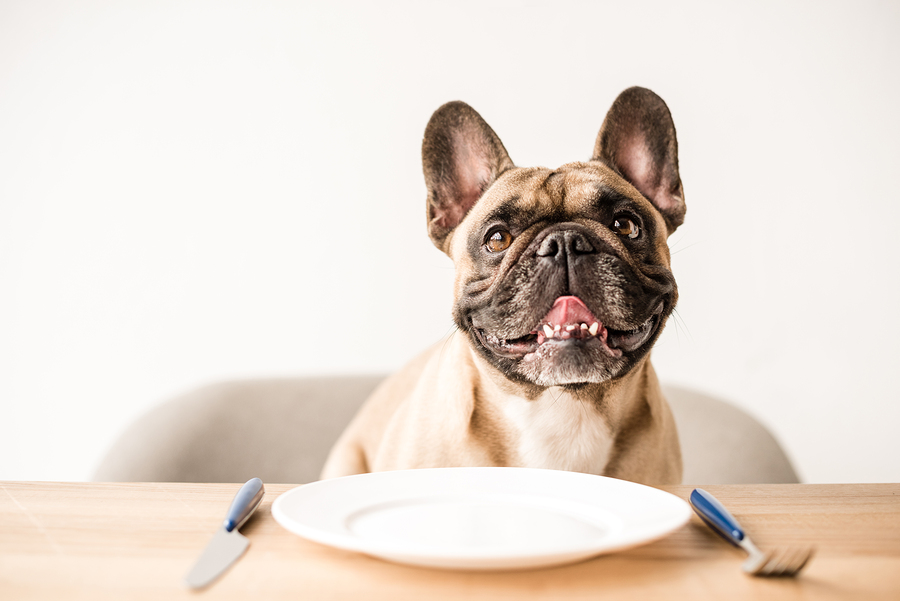
Determining the right amount of food for a French bulldog involves considering factors like age, weight, and activity level. Here is a general guideline to assist you in figuring out the appropriate portion sizes for your furry companion.
Here is a more detailed breakdown of the recommended feeding guidelines for French bulldogs based on age, weight range, activity level, and daily food amount:
- Puppy (2-6 months): 5-14 lbs (2.3-6.4 kg) with high activity level should be fed 1.5 – 2.5 cups (340-570 grams) daily.
- Adult (1-7 years): 16-28 lbs (7.3-12.7 kg) with moderate activity level should be fed 1 – 2 cups (230-460 grams) daily.
- Senior (7+ years): 16-28 lbs (7.3-12.7 kg) with low to moderate activity level should be fed 0.75 – 1.5 cups (170-340 grams) daily.
These amounts are approximate and may need adjustment based on metabolism, activity level, and individual health requirements. Regularly monitor your dog’s weight and adjust their food intake as needed. For personalized advice tailored to your French bulldog’s specific needs, consult your veterinarian.
Frequency of Feeding
It is crucial to establish the correct feeding schedule for your French bulldog in order to ensure their digestive health and overall health. Here is a comprehensive guide on how frequently you should feed your French bulldog according to their age and individual requirements:
Puppies (2-6 months)
French bulldog puppies are in a phase of rapid growth and have higher energy needs. Their small stomachs require more frequent meals to evenly spread out their calorie intake throughout the day and prevent overeating, which can cause digestive problems.
- Recommended Feeding Frequency: 3-4 meals daily.
- Meal Timing: Space out meals every 4-5 hours.
- Controlling Portions: Refer to the feeding guide to measure the right amount and adjust as needed based on the puppy’s development and activity level.
- Transitioning to Adult Food: Begin with puppy-specific formulas and gradually switch to adult food around 6 months old to ensure a smooth transition and avoid digestive issues.
Adults (7 months – 6 years)
Adult French bulldogs have more consistent energy levels than puppies, but it is still important to maintain a regular feeding schedule for them. This helps regulate their metabolism and prevents problems like hypoglycemia and obesity.
- Recommended Feeding Frequency: Feed them 2 meals a day.
- Meal Timing: Offer one meal in the morning and one in the evening.
- Portion Management: Stick to the suggested daily food amount based on their weight and activity level, which is usually around 1-2 cups per day.
- Consistency: Establish a steady feeding routine to support a healthy metabolism and prevent hunger-related behavioral issues.
Seniors (7+ years)
As French bulldogs get older, their metabolism slows down and they may experience age-related health issues that require changes in their diet. It is important to feed senior dogs in a way that provides essential nutrients without putting too much strain on their digestive system.
- Recommended Feeding Schedule: Give them 2 smaller meals each day.
- Meal Timing: Offer meals in the morning and evening, with an optional small, healthy snack in between if necessary.
- Controlling Portions: Adjust the amount of food to match their reduced calorie needs and keep an eye on their weight and overall well-being.
- Special Considerations: Older dogs might benefit from softer food if they have dental problems, and diets with more fiber to promote good digestion.
General Tips for Feeding Frequency
- Consistency: It’s important to stick to a regular feeding schedule for your dog. This can help improve digestion and establish predictability for your pet.
- Monitoring: Keep track of your dog’s weight and body condition regularly. Make adjustments to their meals as advised by your vet to ensure they are getting the right amount of food.
- Hydration: Make sure your dog always has access to fresh water, especially when eating dry food, to support digestion and overall health.
- Observation: Be vigilant for any signs of overeating or undereating, such as sudden changes in weight, lack of energy, or searching for food outside of meal times. These may indicate the need to adjust feeding amounts or frequency.
By following these feeding guidelines, you can help your French bulldog maintain good digestive health, consistent energy levels, and overall well-being. Always seek personalized advice from your vet for the best care tailored to your dog’s specific needs.
Signs of Overfeeding or Underfeeding
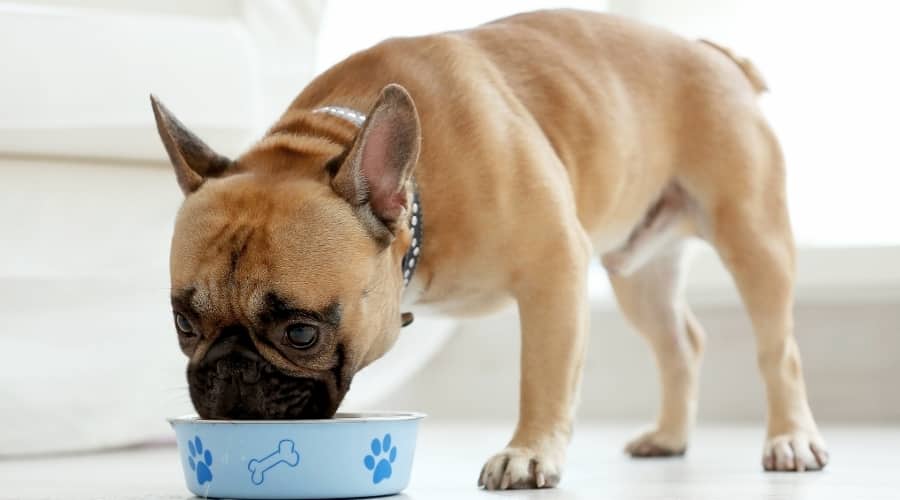
It is crucial to be able to identify the indications of overfeeding or underfeeding in order to keep your French bulldog healthy and thriving. Both situations can result in various health problems that may affect your beloved pet’s overall quality of life. In this article, we outline the typical signs and consequences of both overfeeding and underfeeding.
Signs of Overfeeding
Overfeeding French bulldogs can result in obesity and various health issues. It is crucial to monitor portion sizes and food intake to prevent excessive weight gain.
- Weight Gain: One clear indication of overfeeding is an increase in body weight. You may observe a less defined waistline and an overall growth in the dog’s body size.
- Lethargy: Overweight dogs tend to show reduced levels of activity. If your usually energetic dog appears lethargic, it could be a result of carrying extra weight.
- Heavy Breathing: Excessive weight can strain a dog’s respiratory system, causing them to breathe heavily even when not engaging in physical activity.
- Joint Problems: The additional weight can lead to joint complications and worsen existing conditions like hip dysplasia.
- Frequent Bloating and Gas: Overfeeding can lead to digestive discomfort, resulting in symptoms such as bloating and increased gas.
- Decreased Endurance: An overweight dog may struggle with stamina, getting fatigued more quickly during walks or playtime.
- Vomiting : Many dog owners often wonder ” why is my frenchie throwing up ” and “is vomiting a sign of overfeeding the dog?” the answer is: Vomiting in French Bulldogs may indicate excessive eating, alongside various other potential factors. It’s crucial to supervise their food consumption to prevent overindulgence, which can cause digestive disturbances and vomiting. Adjusting their meal portions and feeding routine can mitigate this problem. If vomiting continues despite dietary adjustments, seeking veterinary advice is advisable to investigate potential underlying health issues.
Signs of Underfeeding
Not providing enough food to your dog can be as harmful as giving them too much, resulting in malnutrition and a deficiency of important nutrients crucial for their health.
- Weight Loss: A visible drop in weight could indicate that your dog is not being fed adequately.
- Lack of Energy: Dogs that are underfed might show signs of tiredness and a lack of interest in playing or exercising.
- Visible Ribs and Spine: If you can easily see your French bulldog’s ribs, spine, or hip bones, they may be underweight.
- Poor Coat Condition: Underfed dogs often have dull, dry coats and may shed more than usual due to a lack of essential nutrients.
- Increased Hunger: Dogs that are not getting enough food may seem constantly hungry and may scavenge or beg for food more often.
- Behavioral Changes: Inadequate nutrition can lead to irritability or anxiety in dogs.
Monitoring and Adjustments
To maintain a healthy weight for your French bulldog, it is important to regularly check their body condition and adjust their diet as necessary.
- Regular Weigh-Ins: Monitoring your dog’s weight frequently can help you keep track of any significant changes. Consult with your vet to determine the ideal weight range for your Frenchie.
- Body Condition Scoring (BCS): Utilizing a BCS chart can assist in assessing whether your dog is at a healthy weight. This scoring system rates your dog’s body condition from being underweight to overweight.
- Dietary Adjustments: Depending on your dog’s weight and activity levels, consider modifying portion sizes or the type of food provided. For overweight dogs, decrease calorie intake and increase physical activity. For underweight dogs, think about offering more frequent meals with higher calorie content.
- Consult Your Veterinarian: Always seek guidance from your vet if you observe signs of overfeeding or underfeeding. They can offer tailored advice regarding your dog’s dietary requirements.
By staying vigilant and taking appropriate actions promptly, you can ensure that your French bulldog maintains a well-balanced diet, keeping their weight and overall health in check.
Special Dietary Considerations
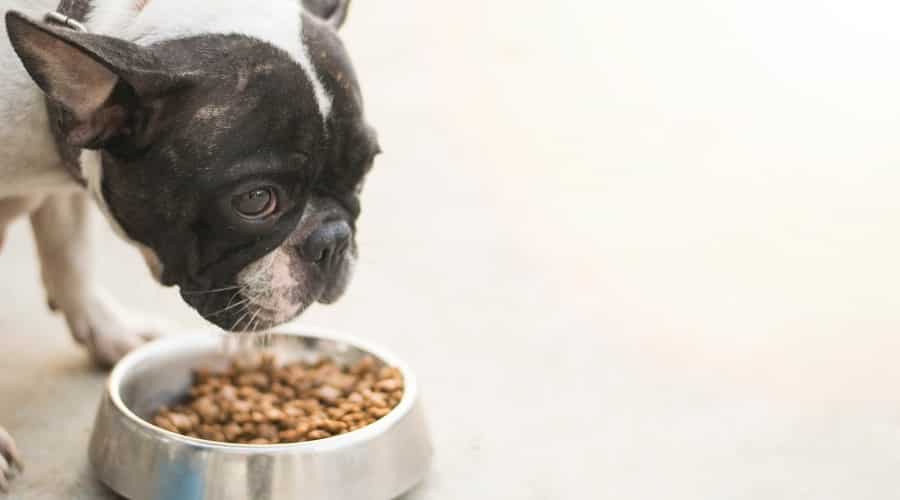
When it comes to taking care of your French bulldog’s diet, you may need to make special adjustments to address specific health issues or conditions. Here are some typical dietary requirements and how to meet them successfully.
Allergies and Sensitivities
Many French Bulldogs are prone to food allergies and sensitivities, with common allergens including beef, chicken, dairy, and grains. To address this, identifying and eliminating the specific allergen from your dog’s diet is crucial. Opting for specialized diets labeled as ” Best food for French Bulldog with skin allergies ” may help alleviate symptoms and promote better skin health.
- Hypoallergenic Diets: Consider transitioning to a hypoallergenic dog food that features unique proteins like duck or venison and excludes typical allergens.
- Limited Ingredient Diets: These diets have fewer components, simplifying the process of identifying and avoiding the allergen.
- Consult Your Vet: Always consult with a veterinarian before making significant dietary changes for your dog to ensure they receive proper nutrition.
Weight Management
Maintaining a healthy weight is essential for the well-being and long life of your French bulldog. Ensuring your dog stays at an appropriate weight will help prevent various health problems such as joint issues and breathing difficulties.
- Reduced-Calorie Diets: If your dog is overweight, feeding them a reduced-calorie diet can assist in weight loss without causing hunger.
- Controlling Portions: It is important to measure your dog’s food portions to prevent overeating and offer smaller, more frequent meals.
- Physical Activity: Pairing a well-rounded diet with regular exercise is key to keeping your dog at a healthy weight.
Senior Dogs
As your French bulldog gets older, their diet requirements will evolve. Older dogs usually need fewer calories but require more fiber and specific nutrients to help their aging bodies.
- Food for Senior Dogs: These specialized diets are tailored to meet the nutritional needs of elderly dogs, with reduced fat and increased fiber content.
- Supplements for Joints: You may want to think about including supplements such as glucosamine and chondroitin to support joint health.
- Water Intake: It’s important to make sure your senior dog drinks enough water, especially if they are eating dry food.
Puppies
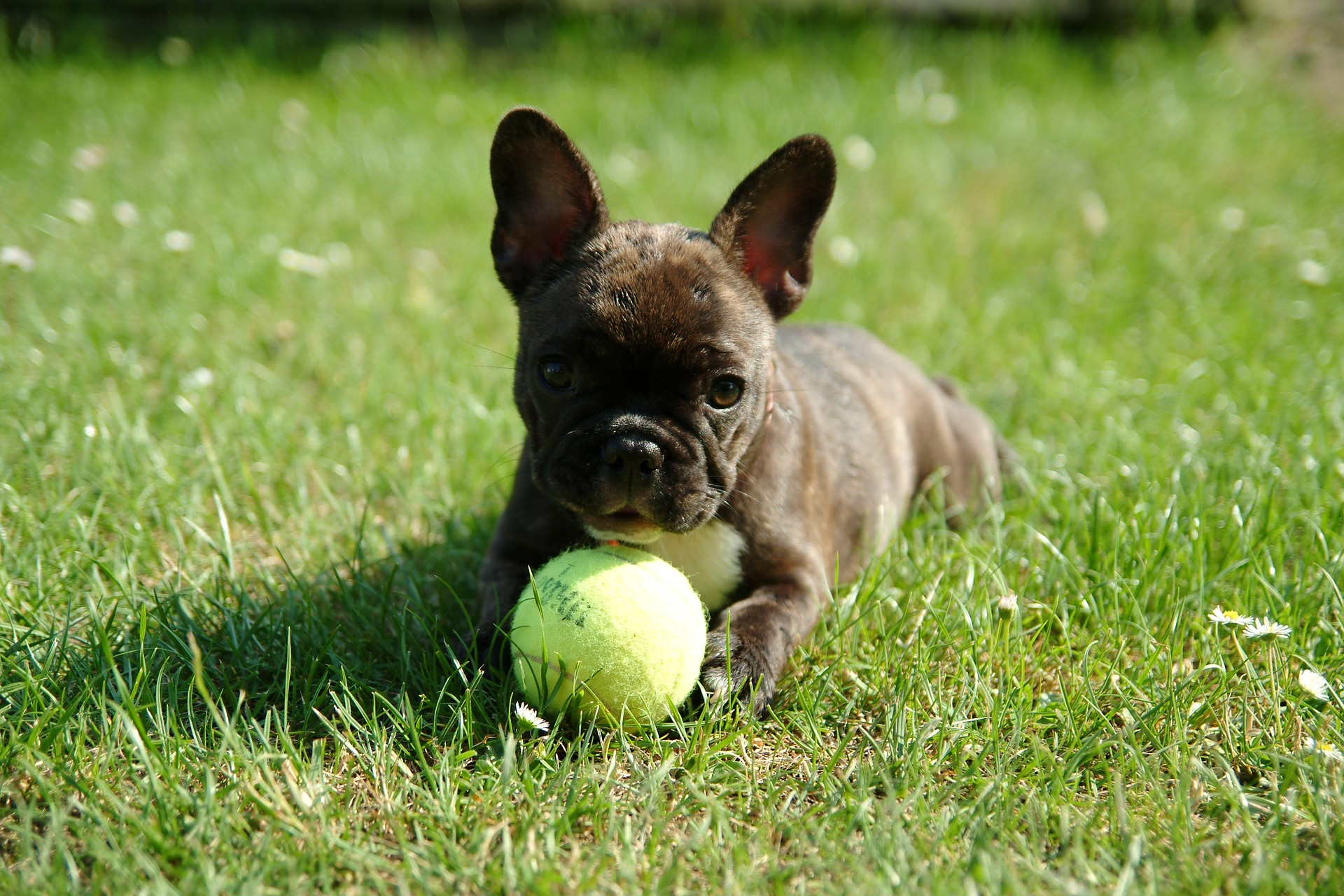
French bulldog puppies require a diet that supports their healthy growth and development, as their nutritional requirements are different from adult dogs.
- Puppy Formulas: Opt for a premium puppy food with the correct proportions of proteins, fats, and carbohydrates.
- Frequent Feeding: Puppies need to be fed more often to maintain their energy levels and aid in their quick development.
- Calcium and Phosphorus: Make sure their diet includes the right amounts of calcium and phosphorus to promote strong bone formation.
Digestive Issues
If your French bulldog is having digestive problems, making changes to their diet can help ease their symptoms.
- Choose Easily Digestible Foods: Select foods that are gentle on the stomach, like rice and plain cooked chicken.
- Include Probiotics: Adding probiotic supplements can support a balanced gut environment and enhance digestion.
- Offer Smaller Meals: Providing smaller, more frequent meals can assist in managing digestive issues and preventing bloating.
By addressing these dietary considerations and adjusting as needed, you can ensure your French bulldog enjoys a healthy and happy life. It’s important to consult with your vet before making any major dietary changes to ensure they are appropriate for your dog’s specific requirements.
Hydration Needs
Proper hydration is essential for the health of your French bulldog.
Ways to Make Sure Your Dog Stays Hydrated:
- Give them fresh water every day.
- Use a water fountain to promote drinking.
- Mix water with dry food or offer wet food.
Conclusion
The above article has helped dog owners answer the question “how much should a french bulldog eat“. From there we understand It is crucial to make sure your French bulldog is getting the right amount and quality of food for their well-being and happiness. By understanding what they need to eat, sticking to a regular feeding schedule, and being aware of signs of overfeeding or underfeeding, you can help your Frenchie live a long and healthy life. Remember to seek advice from your vet for personalized nutrition recommendations that suit your dog’s individual needs. Knowing how much to feed your French bulldog can help them stay at a healthy weight and lead a happy life. Providing proper nutrition is key to ensure your French bulldog is happy and thriving throughout their lifetime.

Welcome to bestfoodforfrenchbulldog.org, the home of Frenchie Fuel, where we are committed to providing top-notch information and guidance on the best nutrition and food for French Bulldogs. We recognize that each dog has specific nutritional requirements, which are particularly vital for breeds like the French Bulldog. Therefore, our mission is to continuously research and discover the most effective nutritional solutions.
Our team comprises animal nutrition specialists and experienced veterinarians dedicated to offering valuable and reliable information to dog owners. In addition to expert advice, Frenchie Fuel. provides a curated selection of premium food products and accessories, carefully chosen to support the health and holistic development of your cherished French Bulldogs. Trust Frenchie Fuel. to be your reliable partner in delivering the highest quality care and nutrition for your French Bulldog!
